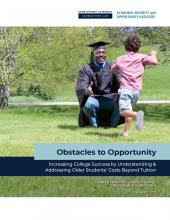Found 8 resources.
0
0
0

Higher education offers millions of people the opportunity to improve their financial well-being. However, higher education is prohibitively expensive and can saddle people with insurmountable debt. Costs beyond tuition—such as housing, food, child care, and transportation—are large, essential components of the cost of attending college for students. In order to better understand how these living costs add up and vary, this report offers estimates of costs beyond tuition for older students between the ages of 25 – 45, who make up roughly one-third of college students and face unique barriers...
Topics: Attendance, Community development, Education, Housing, Post-secondary, Stability, Workforce development
 Shared by Housing Is
on May 20, 2021
Shared by Housing Is
on May 20, 2021 0
0
0
Innovative public housing authorities (PHAs) are collaborating with college access partners and community colleges to increase postsecondary educational achievement for low-income residents and college students experiencing homelessness. This report elevates 11 shared learnings from a recent convening of these five pioneering PHAs and their postsecondary collaborators, and offers a series of recommendations to policy makers, PHAs, and philanthropic organizations seeking to develop emerging cross-sector collaborations between housing and education organizations. The report also includes an...
Topics: CLPHA, Education, Housing, Legislation & Policy, Low-income, Partnerships, Post-secondary, Stability
 Shared by Abra Lyons-Warren
on Oct 6, 2020
Shared by Abra Lyons-Warren
on Oct 6, 2020 0
0
0

Navigating college as a first-generation college student can feel like making your way through a maze with no map, filled with “learn as you go” lessons, and “wow, I wish I knew this then.” When you combine it with being low-income, homeless, and/or food insecure, it can feel like you’re navigating the same maze blindfolded, on a tightrope, balancing multiple responsibilities. It should not be like this.
Topics: Low-income, Post-secondary, Stability, Youth
 Shared by Housing Is
on May 29, 2019
Shared by Housing Is
on May 29, 2019 0
0
0

Founded in 1995 as Project Women, Family Scholar House (FSH) provides comprehensive, holistic services for disadvantaged single parents, their children, and foster alumni. The nonprofit seeks to end the cycle of poverty and transform communities by empowering families and youth to succeed in education and life-long self-sufficiency. FSH provides supportive housing, educational programming, and participant advocacy to help families gain independence.
Topics: Dual-generation, Early childhood, Education, Homelessness, Housing, Low-income, Partnerships, Place-based, Post-secondary, South, Stability
0
0
0
CLPHA’s Education Working Group hosts a webinar including presentations on efforts from the Chicago Housing Authority to work with residents on pursuing postsecondary opportunities, as well as an update from HUD’s Office of Policy Development & Research on data collection around tracking and increasing FAFSA utilization.
Topics: CLPHA, Cost effectiveness, Data sharing, Education, Funding, Housing, Housing Is Working Group, Low-income, Metrics, Midwest, Post-secondary, Research, Stability, Youth
0
0
0
CLPHA’s Housing Is Initiative is engaged in a number of cross-sector activities focused on developing partnerships, facilitating a community of practice, resource development, promoting best practices, online collaboration, policy and advocacy, and training and education. Read about recent activities in this Fall Update.
Topics: Child welfare, CLPHA, Community development, Cost effectiveness, Data sharing, Early childhood, Education, Family engagement, Funding, Health, Homelessness, Housing, Low-income, Medicaid / Medicare, Mental health, Partnerships, Place-based, Post-secondary, Research, Stability, Substance abuse, Workforce development, Youth
0
0
0

Some community colleges have found innovative partnerships with their public housing authorities may help combat student homelessness.
Topics: Asset building, CLPHA, Education, Homelessness, Housing, Low-income, Midwest, Pacific Northwest, Partnerships, Post-secondary, Stability, Workforce development
0
0
0

An organization is using the influence that teenagers have on their contemporaries to help more students from low-income families gain college admission and student aid.
Topics: Education, Low-income, Mental health, Post-secondary, Stability, Youth

